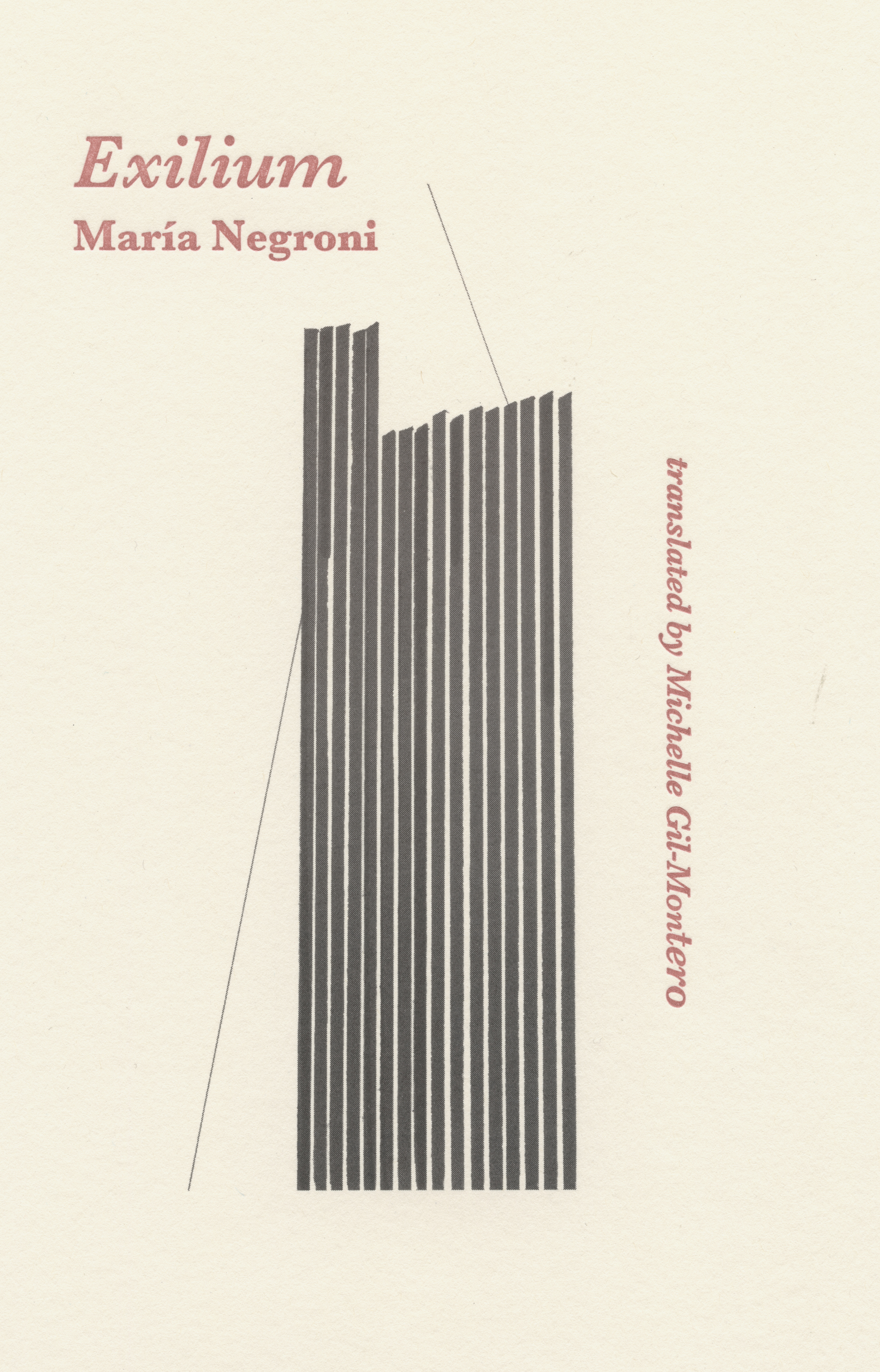
Exilium
María Negroni
Translated by Michelle Gil-Montero
December 2022
María Negroni writes like a dancer.
Kristin Dykstra
As Juan Gelman once wrote, “exile has no form but leaves a trace.” In Exilium, Argentine poet María Negroni sketches precisely such a trace, in a poetic form that approaches opposite extremes of material immediacy and evanescence. On an imaginative terrain that sweeps the Greco-Roman, the “long night” of Argentina’s last dictatorship, and the crisis of displaced migrants today, Negroni locates the exile within poetry itself. In this poetics of exile, the poem shines in its utopian desire to write the “unwritten words,” revealing language at its most estranged, most wanting.
About the Author
María Negroni has published several books of poetry and essays, and two novels. Islandia (Station Hill Press), Night Journey (Princeton University Press), Andanza (The Tango Lyrics) (Quattro Books), Mouth of Hell (Action Books), and The Annunciation (Action Books) have appeared in English translation. Her work has also been translated into Swedish, Portuguese, Italian and French. Negroni received a Guggenheim fellowship for poetry in 1994, a Rockefeller Foundation fellowship in 1998, the Fundación Octavio Paz fellowship for poetry in 2001, and The New York Foundation for the Arts fellowship in 2005. She also received a National Book Award for her collection of poems El viaje de la noche, the PEN Award for Poetry in Translation for Islandia, and the Siglo XXI International Prize for Non-Fiction for Galería Fantástica. She taught at Sarah Lawrence College from 1999 to 2014, and is now directing the first Creative Writing Program to exist in Argentina at Universidad Nacional de Tres de Febrero.
Praise
The eternal return of this exile is the tragic condition of the poem: language is born where paradise, lost, perishes.
Jorge Monteleone
María Negroni writes like a dancer working the barre, her movements lovely, stark, and essential. Her discipline points toward methods of survival despite the body’s disquiet, despite “wrongful objects / in the kiosk of the sky.” Michelle Gil-Montero’s rendition in English conveys the energies and austerities of each poem extending down the center of these pages: toned, gauzy, marvelously nocturnal.
Kristin Dykstra
Attentive as she is to the pre-semantic meanings of sound in Maria Negroni’s work, Michelle Gil-Montero is the ideal translator for these poems. Here, reliably brilliant and adaptive, Negroni sculpts lean, heuristic aphorisms and parables, a connected network of spells and insights that conjure a portrait of the spirit of our time, this living moment.
Forrest Gander
'We are all refugees from our childhoods,' states Pakistani novelist Mohsin Hamid. In spare, dissonant lines driven by imagination, acclaimed Argentine poet, critic, and novelist María Negroni explores exile as a basic human reality. Rather than focusing on her personal biography or engaging directly with politics and history, Negroni evokes exile from an ontological perspective, guiding the reader to a place where “the bishop of water / knocks on the door / delivering endless / tasks,” a place of lamenting “all that effort just to reach / the language / where so many time we were / kids / with winged words.” The thoughtful lament expressed in these poems comes alive in Michelle Gil-Montero's equally thoughtful and passionate translation. Just like Negroni, Gil-Montero strives to find the precise words to evoke a reality that, though known to all of us, constantly eludes our understanding.
Jeannine Marie Pitas
About the Translator
Michelle Gil-Montero is translator of contemporary Latin American poetry, hybrid-genre work, and criticism. She has translated Poetry After the Invention of América: Don’t Light the Flower by Andrés Ajens (Palgrave Macmillan); Mouth of Hell (Action Books), The Tango Lyrics (Quattro Books), Dark Museum (Action Books), and The Annunciation (Action Books) by María Negroni; and Edinburgh Notebook and This Blue Novel by Valerie Mejer Caso (Action Books–National Translation Award semi-finalist). She has been awarded fellowships from the National Endowment for the Arts and the Howard Foundation, as well as a Fulbright US Scholar’s Grant to Argentina, a PEN/Heim Translation Prize, and a SUR Translation Support grant. She is the author of Attached Houses (Brooklyn Arts Press) and Object Permanence (Ornithopter Press), and her poetry has appeared in jubilat, Spoon River Poetry Review, Seedings, and other publications. At Saint Vincent College, she directs the Minor in Literary Translation and the publisher Eulalia Books.
In the News
Links
Publication Details
ISBN: 978-1-946433-92-3
Trade Paperback
128 pp, 5 x 8.25 in
Publication Date: December 15 2022
Distribution: Asterism Books (US)